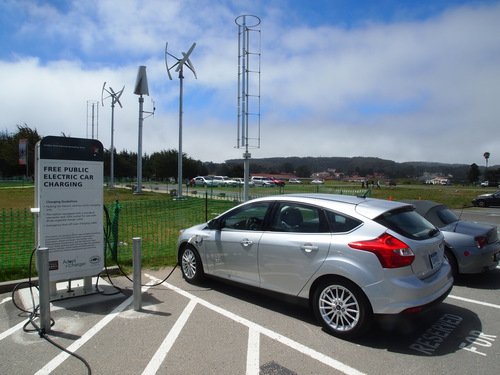Electric vehicle owners in Iowa, and those wishing to drive across Iowa, might feel frustrated with relative scarcity of charging stations. Recently while scoping out the feasibility of driving an electric car from Kansas City to Minneapolis, I found very few charging stations in Iowa. It turns out that electric utility companies in Iowa assert that an electric vehicle charging fee measured by the kiloWatt-hour would violate the state-guaranteed monopoly of utility companies. Since by-the-kiloWatt-hour fees are the clearest EV charging fee structure, it essentially froze development of EV charging infrastructure in Iowa. That is until an Iowa Utilities Board ruling changed the rules to not only allow charging networks to set fees as they wish, but to utilize on-site solar/wind resources.
According to an article with Energy News![]() , an issue arose when The Worlds Largest Truckstop, the Iowa 80 Truck Stop, wanted to install EV charging stations. The local electric utility, Interstate Power and Light, claimed that Iowa 80 could not charge a per-kiloWatt-hour fee because this would violate the state-monopoly that electric utilities have for selling electricity to the public.
, an issue arose when The Worlds Largest Truckstop, the Iowa 80 Truck Stop, wanted to install EV charging stations. The local electric utility, Interstate Power and Light, claimed that Iowa 80 could not charge a per-kiloWatt-hour fee because this would violate the state-monopoly that electric utilities have for selling electricity to the public.
Many states have such a requirement, that the state grants a monopoly to utility companies as the only sort of company allowed to sell electricity by the kiloWatt-hour. Therefore to sell electricity an EV charging company would therefore be required to be certified as an electric utility.
That led charging station networks to use different fee structures depending on the local laws. In states allowing per-kiloWatt-hour pricing, the fee would be measured in kiloWatt-hours provided. In other states a per-hour or per-minute fee would be charged instead. But a fee based on time connected to the charging station is unfair to customers, especially those with cars that charge more slowly.
The customers of course prefer per-kiloWatt-hour pricing since that is the clearest model.
The Iowa Utilities Board ruling![]() changes this for the better. Details concerning the changes are below. The bottom line is that:
changes this for the better. Details concerning the changes are below. The bottom line is that:
- Charging station owners are now free to set fee structures as they see fit
- Charging station owners are required to either buy electricity from the local utility company or to use electricity generated on-site behind the utility meter
- Electric utilities are prohibited from selling electricity to charging stations outside their service territory
The middle requirement is very interesting because it opens the door to combining on-site solar or wind resources with a charging station.
A “behind the meter source” for electricity means there would be some kind of electricity generator attached to the same electric meter as the charging station. The most likely is to have an on-site solar array or wind turbine farm to generate electricity which is directly used by the charging station.

This picture was taken in 2012 when I was loaned a Ford Focus Electric for a week-long review/testing period. This charging station is at Crissy Field in San Francisco, at the time (in 2012) it was operated by Adopt-a-Charger and I understand that since then it has been replaced with a ChargePoint charging station. In any case the wind turbines in the background make for an excellent show while charging an electric car, but I understand that in this case they do not supply electricity to run the charging station.
Aren’t most EV charging stations in a location where a solar array can be installed above a parking lot? Some, as in this case (the entrance to San Francisco Bay has a lot of wind), have a lot of wind blowing and could site a few wind turbines as shown here. Why not incentivize the combination of on-site renewable energy and electric vehicle charging.
I guarantee that the majority of EV owners would be proud to charge at a station where they could see visible solid proof that their electrons came from renewable energy resources.
In fact back in 2013 Tesla Motors promised the Supercharger network would be able to run even after the Zombie Apocalypse. What this meant is that Tesla has a long-term goal that all or most of the Supercharger locations would have on-site solar panels and energy storage. Tesla CEO Elon Musk promised the combination would be enough so that each Supercharger location could keep running even if the local grid goes down. The assumption is that Tesla looks to also be supplying electricity to the grid and to earn grid services revenue by virtue of having a large distributed fleet of grid-scale energy storage systems. While it seems that most Supercharger locations today have not implemented the vision, I noted in 2017 that some have done so.
Details of the new language concerning EV charging station fees
In June 2019, the Board issued the following proposed language change:
20.20 Service to Electric Vehicle Charging Stations.
DOCKET NO. RMU-2018-0100 – Iowa Utilities Board
(1) An electric vehicle charging station is not a public utility under Iowa
Code section 476.1 if the charging station receives electric service from
the electric utility in whose service area the charging station is located
or obtains electricity from a behind-the-meter source.
(2) Electric utilities and entities providing commercial or public electric
vehicle charging shall comply with all applicable statutes and
regulations governing the provision of electric vehicle charging service,
including, but not limited to, all taxing requirements, and, if necessary,
file all appropriate tariffs.
To disentangle this a bit – the effect of the first clause is that an EV charging network operator is not a public utility, so long as they follow the conditions. Namely, that either the electricity sold through the charging station is bought from the local utility company, or is generated by an on-site electricity resource. The “behind-the-meter” phrase means the electricity generation and the charging station needs to be on the same electric meter.
The second clause says that electricity utility companies cannot supply electricity to charging stations outside its service territory. The words quoted above don’t seem to say that clearly, but the Ruling document goes on to explain:
In other words, if an entity furnishing electricity to an EV charging station is a public utility under the “facts-and-circumstances” approach, Iowa Code § 476.25(3) could be implicated, which precludes an electric utility from serving or offering to serve “electric customers in an exclusive service area assigned to another electric utility . . . .”
DOCKET NO. RMU-2018-0100 – Iowa Utilities Board
As the Board noted in its ruling document, there are two electricity transactions when we charge an electric vehicle at a public charging station:
First, an electric energy transaction occurs between the EV charging station and the vehicle (i.e., charging the EV’s batteries). Second, a potential electric energy transaction occurs through the electric energy generator supplying electricity to the EV charging station.
DOCKET NO. RMU-2018-0100 – Iowa Utilities Board
It is explained that the purpose of this Rule-making was clarifying that an EV charging station or charging network does not become a public utility solely by virtue of selling electricity through a charging station. Further that the legality of the second transaction is “determined under existing adjudicatory and statutory law.”
The final language is:
199—20.20(476) Electric Vehicle Charging Service.
DOCKET NO. RMU-2018-0100 – Iowa Utilities Board
(1) Electric energy sold for the purpose of electric vehicle charging at a commercial or public electric vehicle charging station constitutes neither the furnishing of electricity to the public nor the resale of electric service. If the electricity used for electric vehicle charging is obtained from a rate-regulated public utility, the terms and conditions of the service to the electric vehicle charging station shall be governed by and subject to the utility’s filed tariff. A rate-regulated public utility shall not, through its filed tariff, prohibit electric vehicle charging or restrict the method of sale of electric vehicle charging at a commercial or public electric vehicle charging station.
(2) A person, partnership, business association, or corporation, foreign or domestic, furnishing electricity to a commercial or public electric vehicle charging station shall comply with Iowa Code section 476.25.
(3) Electric utilities and entities providing commercial or public electric vehicle charging shall comply with all applicable statutes and regulations governing the provision of electric vehicle charging service, including, but not limited to, all taxing requirements, and shall, if necessary, file all appropriate tariffs.
- The USA should delete Musk from power, Instead of deleting whole agencies as he demands - February 14, 2025
- Elon Musk, fiduciary duties, his six companies PLUS his political activities - February 10, 2025
- Is there enough Grid Capacity for Hydrogen Fuel Cell or Battery Electric cars? - April 23, 2023
- Is Tesla finagling to grab federal NEVI dollars for Supercharger network? - November 15, 2022
- Tesla announces the North American Charging Standard charging connector - November 11, 2022
- Lightning Motorcycles adopts Silicon battery, 5 minute charge time gives 135 miles range - November 9, 2022
- Tesla Autopilot under US Dept of Transportation scrutiny - June 13, 2022
- Spectacular CNG bus fire misrepresented as EV bus fire - April 21, 2022
- Moldova, Ukraine, Georgia, Russia, and the European Energy Crisis - December 21, 2021
- Li-Bridge leading the USA across lithium battery chasm - October 29, 2021












